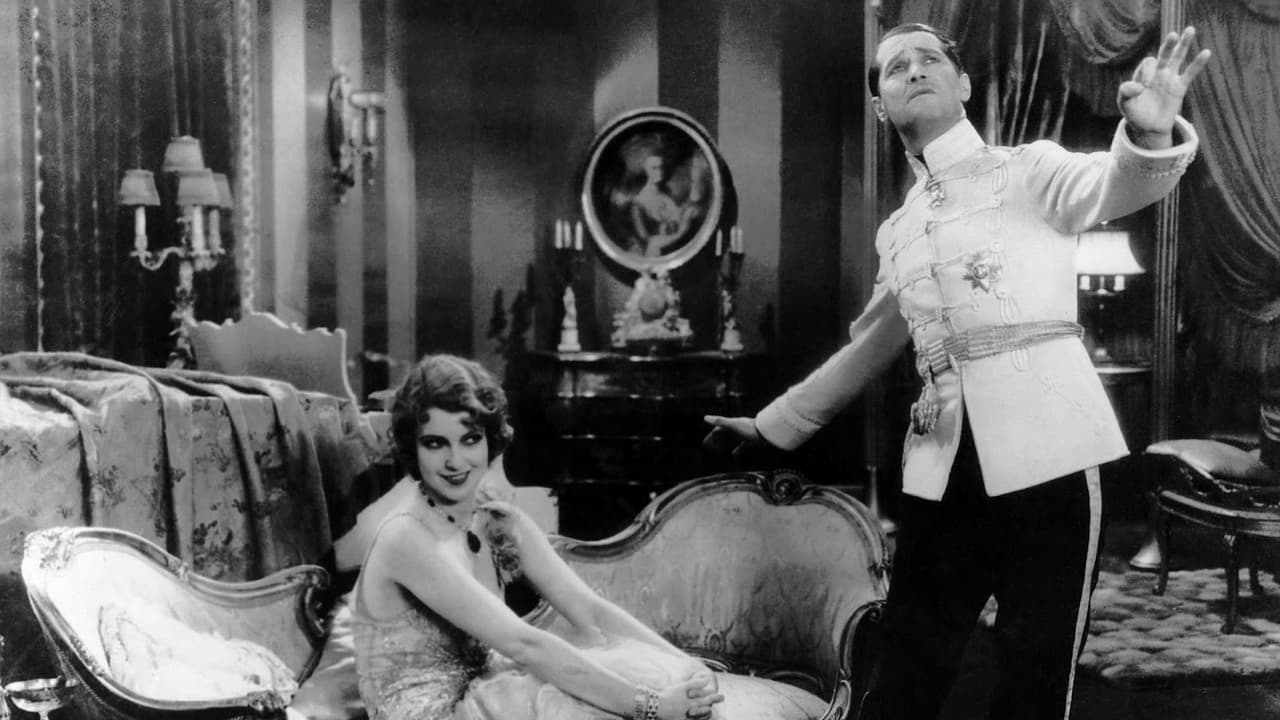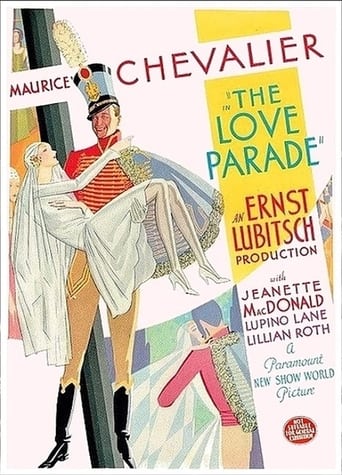

"Anything for the Queen" will be my new motto around the household, specifically for my bf. It is good to see that you can learn something from 82+ years ago for the first time.I've always been a fan of 30's musicals so it was a treat to see this movie for the first time of my life as a historical piece, but also to see the development of musical movies from the start. I am blessed to live within 30 miles of the Stanford Theater in Palo Alto, CA that offers amazing film histories, museum and revivals every week of the year.I can now see why Chevalier was such a hit -- he had natural wit, humor and timing, something I never witnessed in later films (such as Gigi) where his talents were mostly condensed down to singing.Jeanette McDonald's operatic singing was extraordinary, but does feel "dated" in the film in contrast to the impeccable performances, timing, dance and humor-filled vaudevillian routines of Lupino Lane and Lillian Roth. IMO they stole the show (sort of like a 'Jack & Karen' team did from "Will & Grace").I would see the movie again just to check out the servant scenes and a well-deserved nod to the animal trainer for the dog performances. The entire cinema was laughing at the opening goodbye to Paris scene.
... View More"Even if the Queen liked him, would he be eligible to become the Queen's consort?" asks a courtier."Absolutely!" says the prime minister. "His great-grandfather was the illegitimate son of one king and his grandmother the sweetheart of another.""I had no idea he came from such a distinguished family," says the minister of war.And before long Count Alfred Renard (Maurice Chevalier), the former Sylvanian military attaché at the embassy in Paris, is being married to Louise (Jeannette MacDonald), Queen of Sylvania. We're halfway through the first musical Ernst Lubitsch made in Hollywood, and a delight it is. It's Ruritanian operetta, or rather Sylvanian operetta, but it shows what Lubitsch was doing to bring an early Hollywood cliché -- musicals filmed with cameras pointed straight at the stage-bound musical numbers -- into what the musicals, influenced by Lubitsch, became. The effervescent and amusing songs, with music by Victor Schertzinger and lyrics by Clifford Grey, for the most part come from the plot. The camera moves fluidly. The actors don't play to the camera except when Lubitsch deliberately has them do so.Most importantly, the movie is a delight. For a generation or two who uneasily know of Maurice Chevalier only as an old man telling us how much he loves little girls, Chevalier in his prime shows us why he became such an international star. The man is sexy, charming, worldly and likable. He has a self-deprecating sense of humor. His Alfred Renard is a womanizer of the old school he doesn't love them and leave them, he loves them and leaves them smiling, as satisfied as he is. Jeannette MacDonald is a revelation for those most familiar with her trilling a song in duet with the wooden Nelson Eddy. She's quite good as a light comedienne and manages to keep Chevalier from overshadowing her.The story? Renard is recalled from Paris because of his scandalous doings with wives, maids and duchesses. He returns to Sylvania, where the Queen is prepared not to be amused. But Queen Louise also dreams of having a husband who loves her as a woman, not a Queen. She is beautiful, a bit imperious, and agrees that any husband of hers will not become the king, only a prince consort. And after the two marry, a case it appears of true love, will the Queen be smart enough to distinguish between the role of a prince consort and the role of her husband. And will Alfred be able to teach Louise a thing or two about being a wife as well as a Queen. Well, remember this is an operetta and anything but a happy ending would be awful. In fact, Lubitsch gives us an ending that is a deliberate reverse of the first wooing scene between the Count and the Queen. It is so unexpected, so clever and so affectionate, the only thing you can do is smile in appreciation. Along for the story is Alfred's man's man played by Lupino Lane and a maid of the Queen played by Lillian Roth. They have a couple of comic numbers and are first rate, especially Lane. He was a great comic star in England who built into his acts physical business that might make the Nicholas Brothers envious. (And he also was Ida Lupino's uncle.)The Love Parade is pre-Code. That's another way of saying that, as a Lubitsch film, it's naughty and sophisticated. With the Count and the Queen, sex is as much a part of love as a kiss. You might have one without the other, but it wouldn't be half as much fun.
... View MoreDomestic difficulties between the strong-willed Queen of Sylvania and her stubborn Consort may cause them both to miss THE LOVE PARADE.Director Ernst Lubitsch spread his special brand of sophisticated naughtiness in this visually impressive & engaging early talkie musical. Depending much on the intelligence of the viewer, the film serves up unexpected bons mons of wit (e.g. the dog barking his farewells to the pooches of Paris) which never fail to enchant. Lubitsch would contribute a series of delightful little comedies over the next several years, making the title of this confection pertinent in more ways than one.Maurice Chevalier practically oozes Gaelic charm in a wonderfully hammy, ingratiating performance. His French charisma dominates the screen; he embraces his songs rather than just singing them. His immense joie de vivre & exceptional talent was perfectly attuned to the sound motion picture. In her film debut, the lovely Jeanette MacDonald proves a charming partner to Chevalier. Imperious or coquettish by turns, she beguiles the viewer as well as Maurice--her celebrated voice (when intelligible) put to good use in the seduction.British physical comedian Lupino Lane is a winner as Chevalier's highly energetic little valet; lanky Lillian Roth, as a palace maid, joins him for some humorous knockabout songs. Lionel Belmore & Eugene Palette bring appropriately hefty gravitas to their roles as government ministers. Diminutive Edgar Norton appears as an unflappable majordomo.Movie mavens will recognize silent screen comic Ben Turpin as a cross-eyed lackey, Russ Powell as the Afghan Ambassador and young Jean Harlow as one of a group of women applauding Chevalier at the theatre, all uncredited.
... View MoreToday, this film seems very dated. However, the wit of the writing and direction and the charm of the leading characters makes it still worth watching. The singing is enjoyable, but there are no particularly memorable tunes. The renowned "Lubitsch touch" is evident.
... View More